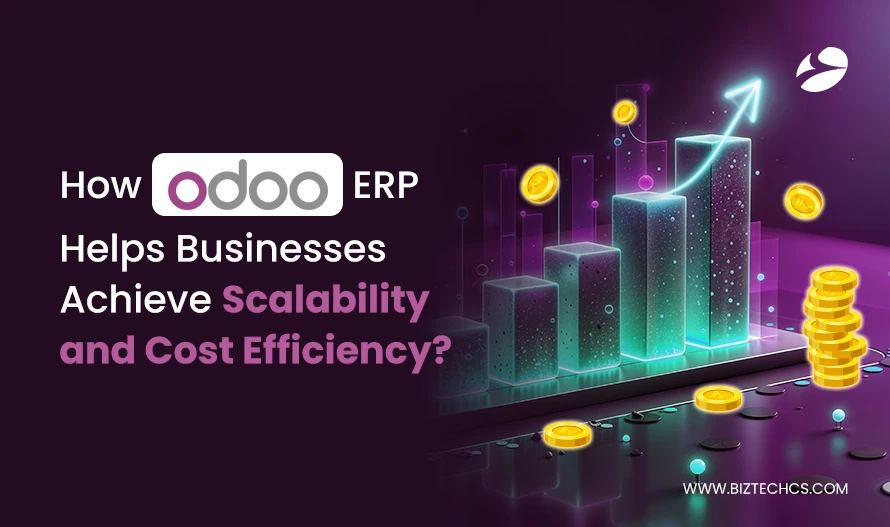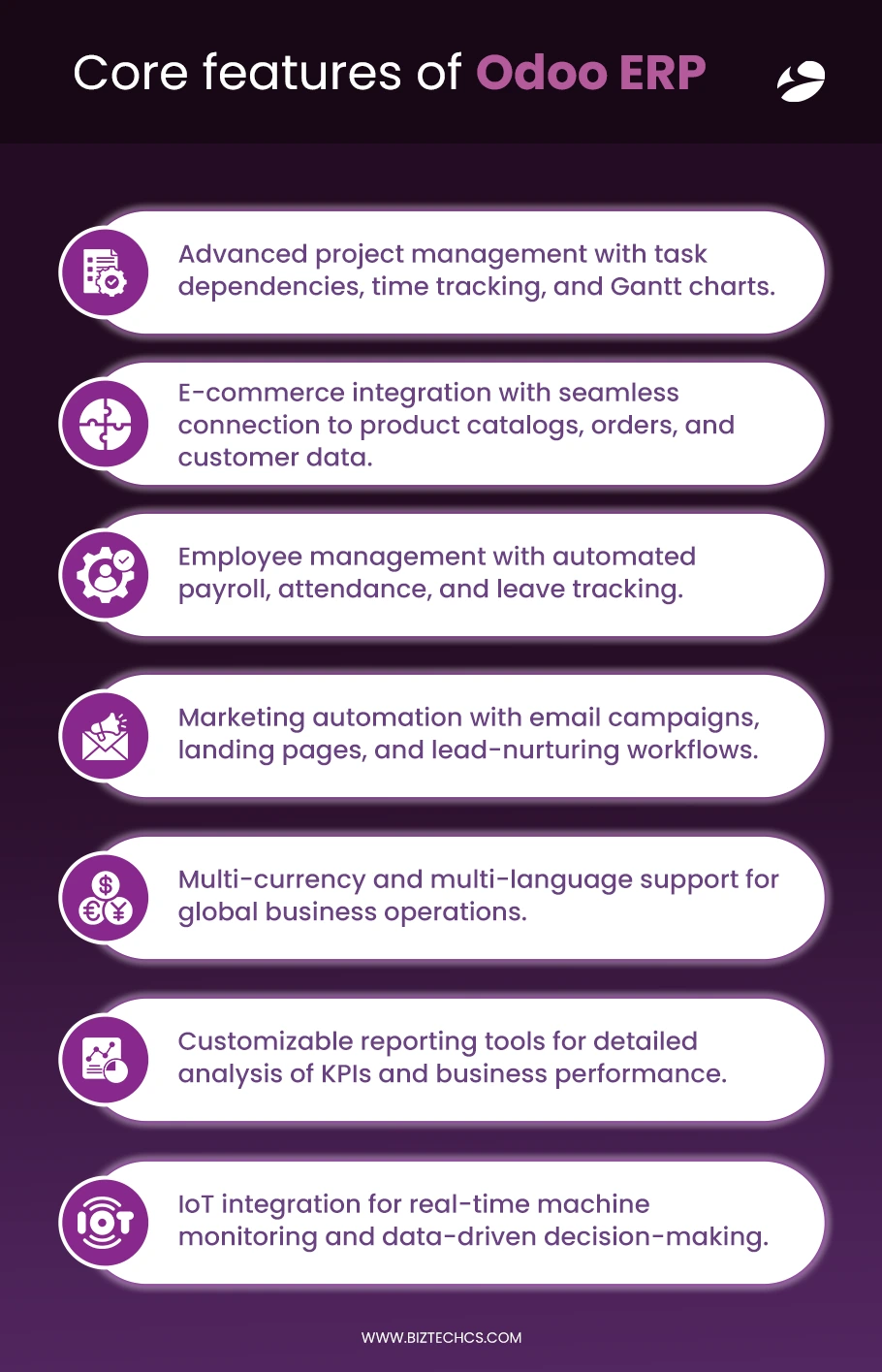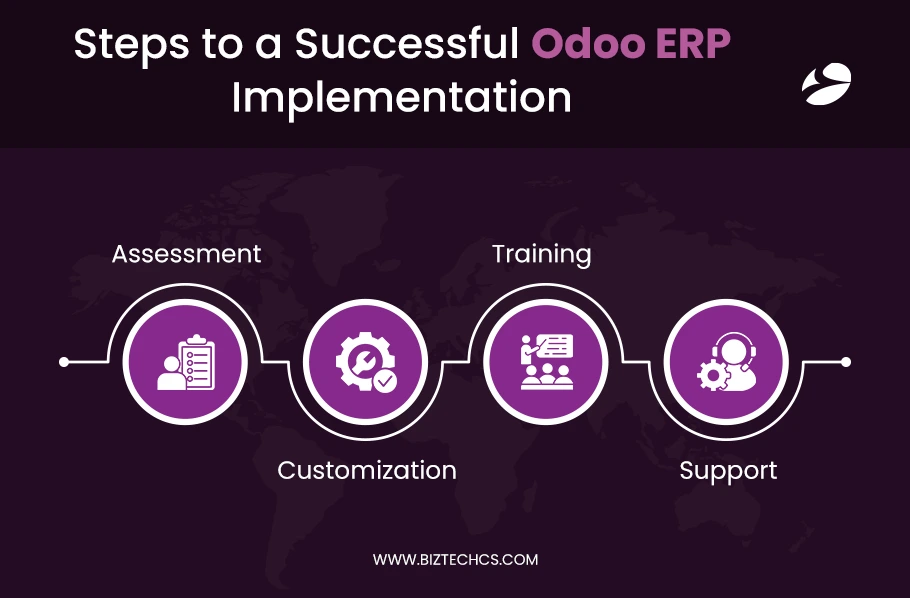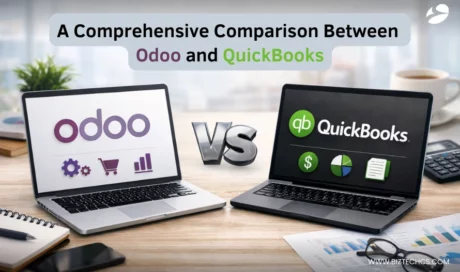2795
How Odoo ERP Helps Businesses Achieve Scalability and Cost Efficiency?
10 min read
2795
10 min read

A report didn’t match the forecast, a shipment ran late, and a sales team waited hours for updated inventory data. These moments seem small until they affect customers, revenue, and trust.
In 2025, this is not even a matter of where operations were lagging; it is itself a symptom of unscalable systems. Earlier, companies that ran smoothly on spreadsheets, emails, and standalone tools now find that those methods are in their way.
This is where an ERP system no longer means just software but rather represents the very backbone that ties every facet of business together. Getting the right Odoo partners means businesses can fully realize Odoo’s potential through targeted ERP implementation and custom app development that solves the big and small challenges in their way.
Odoo thus originated in 2005 as a simple business tool called TinyERP. The aim then was to allow small teams to manage operations without juggling multiple systems. By 2009, it graduated to OpenERP and started receiving some popularity for its flexibility. It did not take long before companies of all sizes implemented it.
In 2014, the platform was finally rebranded as Odoo to reflect its wider embrace and sharper skills. Gradually, it started expanding from invoicing to an eCommerce module by module.
Today, it operates businesses in over 120 countries worldwide. An experienced Odoo ERP development company may customize Odoo ERP services for any industry, enabling the system to be as lean or deep as desired.

Most ERP systems have fixed pricing and modules. This flexibility is complemented by the best Odoo integration, ensuring smooth communication with your other systems.
Licensing and implementation fees are also very predictable. For most businesses, that control and cost balance makes Odoo a practical choice.
Odoo ERP brings departments like sales, accounting, inventory, and HR into a single platform. This eliminates the need for separate systems that often cannot communicate with each other. Teams can view and update the same information without waiting for some type of manual handover. This reduces errors caused by duplicate entry or simple miscommunication. Over time, workflows run faster, and there are fewer operational delays.
Odoo ERP changes with business needs. New store branches, new hires, and new product lines can all grow in the system. So you may choose to start with a few modules and add more along the way. That means not paying for features you don’t use. Also, it spares you from the disruption of platform switches during business growth.
Automation is changing the world. Tasks like invoicing, customer follow-ups, and even stock updates no longer need personal attention, and this is a step in the right direction. With automation, assistance is available on demand, resulting in monetary and time savings and reduced human errors.
Additional control over procurement, order management, and inventory ensures spending within the company is more streamlined and manageable.
The system saves effort by identifying where expenses are occurring, which adds value to the company’s long-term financial position.
Odoo offers up-to-the-minute reports and dashboards regarding the business’s status. Managers and their teams can use this information in real time, complementing their activities and promoting better efficiency. This reduces the overspending and resource waste that come with outdated data.
Reports can now be accessed seamlessly and in a single window, so data consistency is maintained throughout departments. This promotes better coordination, accelerated decision making, and speedy troubleshooting.
Business processes remain dynamic with modern businesses’ changing environment and competitive landscape. Odoo provides the freedom to customize processes through app development.
This means that systems can shift with changing business goals.
This benefits all teams within organizations, as less time is wasted trying to fit processes into a generic set of procedures. Enhanced flexibility guarantees the best process fit within different organizational levels.
When everyone operates within a single system, coordination improves dramatically. There is no file sending or updating wait times, as everyone operates from the same data set, which mitigates confusion.
Centralized data also accelerates the pace at which tasks are completed, since people and steps are linked in one seamless flow. All integrated systems ensure accountability is easily constructed because everything is tracked in one location.
Meeting compliance requirements regarding tax, audit, industry standards, and other requirements is simplified with Odoo. Records will always be up to date and stored in an organized manner, making them easy to access whenever the need arises.
The system supports both local and international reporting styles. Reports can be generated on demand without the need for external spreadsheets. This minimizes risk and saves time for audits or inspections.
A growing construction company faced challenges tracking raw materials and finished goods. Orders were being delivered late because teams were not working on inventory alignment or scheduling.
With Odoo ERP, inventory management integrates with production planning and quality assurance checks all in one place. Work order generation is automated, and controls are placed at every process step to ensure quality. This cuts down on waste, guarantees deliveries, and ensures that production is always on schedule.
This is perhaps the best demonstration of ERP digital transformation resolving actual challenges encountered on the shop floor.
Retail chains struggle to integrate online orders with in-store purchases and inventory management. Odoo ERP consolidates Point of Sale, CRM, and backend systems into a single platform. Employees can check stock, whether in-store or online, which is helpful with real-time product availability.
Loyalty program management, returns, and promotions operate more efficiently. Service is quicker provided, and stock does not become stagnant. Many retailers use Odoo implementation services to enhance control over their online and offline sales channels.
Apprehension within a clinic’s many departments stemmed from a lack of proper visibility into patient files and schedules. Appointments were frequently forgotten, and billing mistakes started occurring. Patient management, appointment scheduling, and billing are bundled in Odoo’s healthcare modules.
Medical staff receive real-time updates, and patients receive automatic reminders. Better coordination aids much of the care delivery needed. With smart Odoo customization services, workflows are designed for the distinct requirements of a single clinic or hospital.
Fleet slowdowns, missed deadlines, and misplaced inventories affect logistical companies daily. With a mouse click, Odoo enables vehicle monitoring, route management, and warehouse work on one screen.
Shipment documentation, tracking, and status updates are done automatically without any paperwork. Drivers receive instructions based on the current status, and warehouse staff know the item’s exact static destination.
For companies shifting from older systems to Odoo, Odoo migration services provides seamless migration that’s data safe and devoid of workflow changes.

Assessment starts with performing an elaborate analysis, as writing code or developing does not come first. The organization’s performance regarding infrastructure needs analysis on the current range of systems in use, and identify hot spots.
Reviewing as many diverse workflows as possible, identifying bottlenecks, and survey goals is essential. None of the systems implemented will fix any underlying issues without this method.
A thorough assessment ensures the system setup is not based on guesses. This also enables a smoother transition for clients that Odoo implementation services build out.
These changes, however minor, make a difference. With expert Odoo customization services, the system is molded around how the team works instead of the other way around.
These changes, however minor, make a difference. With expert Odoo customization services, the system is molded around how the team works instead of the other way around. This ensures usability across the entire organization, which increases adoption across the board. When a system is well designed, it is easier to maintain in the long run.
Like all powerful ERPs, system deployments need proper user education to be effective, and this gets amplified without adequate training. An organization needs more than clicking on buttons; the reason behind each action must be taught.
To achieve the best results, divide and conquer with role-specific sessions so that focus is directed to what is used daily.
Capture all questions as they arise and tackle them immediately. Practical training encourages exploration and, by building confidence, prevents expensive blunders.
After go-live, the system requires constant attention. Features become outdated, teams expand, and requirements change. A reliable partner intervenes with updates, surveillance, and responses.
Whether repairing a minor glitch or enhancing performance, support ensures the system stays healthy. Especially during Odoo Migration Services, when companies transition from legacy systems. Quality support ensures improvements extend far beyond the go-live moment.
One of the leading organizations in the education sector struggled with handling library functions, purchasing orders, and employee expenses in isolated systems. Their current platform didn’t facilitate real-time synchronization, leading to delays in updates and communications.
A tailor-made Odoo ERP system was implemented and integrated with their online store so that operations could be centralized. This facilitated easier procurement, effective expense tracking, and automated book returns with penalty management.
The outcome was a notable enhancement of operational efficiency and control between departments.
One of the major flag production companies required updating its online business and internal processes. The current ERP system was not flexible enough for custom product designs, real-time pricing, and logistics handling.
An effective Odoo ERP implementation introduced a dynamic product configurator, powerful pricing capabilities, and hassle-free shipping integration.
Industry-specific requirements, such as weather-related information and supplier coordination, were managed with intelligent customizations. As a result, the company experienced higher order levels, improved delivery times, and increased customer interactions.
A PVC-coated fabric manufacturer catering to industries such as architecture, transportation, and lifestyle was experiencing increasing problems with production time lags, inventory mistakes, and manual order processing. Its current Excel-based system could not keep up with the complexity of expanding operations.
With the implementation of Odoo ERP, manufacturing, inventory, quality control, and sales were integrated into a single streamlined system. Production planning improved, waste was minimized, and customer orders were managed with customizable specifications.
Consequently, the company experienced quantifiable improvements in efficiency, product quality, and repeat business—demonstrating how industry-specific Odoo ERP implementation services can deliver tangible operational gains.
Choosing the appropriate Odoo ERP implementation partner begins with recognizing your company’s requirements. A quality partner invests time in discovering your operations before proposing solutions.
They must have first-hand experience in your vertical and understand how modules integrate. Technical expertise is not adequate—genuine benefit arises from resolving genuine issues. Companies frequently seek assistance after setup, including Odoo migration and regular Odoo customization services.
A trusted team can evolve the system as your requirements shift and assist in guiding your ERP digital transformation without impacting your day-to-day operations, through expert Odoo implementation services. This involves more than product knowledge but a robust history of successful delivery. That’s BiztechCS’s contribution across sectors—making Odoo implementation services feasible, reliable, and long-lasting.
Most companies today are realizing their existing systems no longer are designed for where they’re going. Delays, manual processes, and fragmented tools hinder progress and affect customer confidence.
Odoo ERP provides a clear path ahead by integrating production, sales, inventory, and reporting. With its adaptable structure, businesses can begin simple and grow as they expand. With real-time information and customized workflows, decisions become simpler and quicker every day.
The transition can be both stable and efficient with reliable partners providing Odoo implementation services, Odoo customization services, and seamless Odoo migration services. The time is for businesses ready to start their ERP digital transformation. Contact us for a consultation and begin building a system that supports your growth.

Artificial Intelligence (AI)
293
By Nandeep Barochiya

Odoo
342
By Uttam Jain

Artificial Intelligence (AI)
624
By Nandeep Barochiya